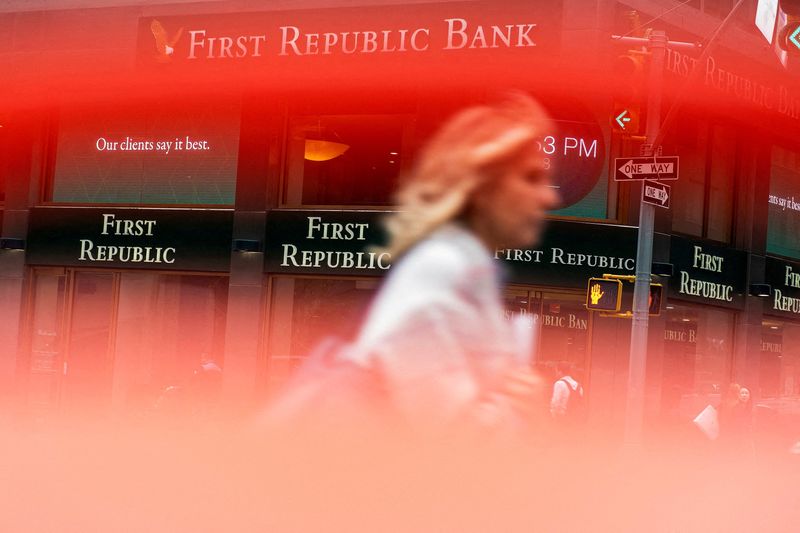By Lawrence Delevingne
(Reuters) - The focus of the U.S. regional banking crisis turned on First Republic Bank (NYSE:FRC) in late March after the wealthy clients it courted to fuel its breakneck growth began pulling their deposits.
With no let-up in pressure on First Republic, the biggest U.S. bank JPMorgan Chase & Co (NYSE:JPM), said on Monday it will buy most of the San-Francisco lender's assets after regulators seized the troubled lender over the weekend.
The failure of First Republic, which said last week it had first-quarter outflows of more than $100 billion, marks the demise of a third major U.S. bank in just two months, after Silicon Valley Bank and Signature Bank (OTC:SBNY).
Here are some of the factors behind its fall and what the JPMorgan deal is likely to mean:
FIRST REPUBLIC'S GROWTH
Founded in 1985 by James "Jim" Herbert, son of a community banker in Ohio, First Republic focused early on providing big loans at cheap rates. Merrill Lynch acquired the bank in 2007 but First Republic was listed on the stock market again in 2010 after being sold by Merrill's new owner, Bank of America (NYSE:BAC).
First Republic's business model was to lure high net-worth customers with preferential rates on mortgages and loans. Its customers have included Instacart founder Apoorva Mehta, investor Chamath Palihapitiya and real estate developer Stephen M. Ross, according to bank promotional materials.
First Republic also catered to other members of the community, according to bank materials which note that schools and non-profits account for 22% of its business loans.
First Republic said in January its shareholder returns were compounded at 19.5% annually, more than double its peers. It said its median single-family home loan borrower had access to cash of $685,000, significantly more than the average American.
However, its strategy made it more vulnerable than regional lenders with less-affluent customers, since U.S. deposit insurance only guarantees $250,000 per savings account.
First Republic had a high level of uninsured deposits.
Meanwhile, its loan book and investment portfolio also became less valuable as the U.S. Federal Reserve bank raised interest rates, hampering its chances of a capital raise.
AND HOW IT UNWOUND
First Republic started amassing paper losses last year when the Fed began hiking U.S. interest rates to fight inflation.
Gross unrealized losses in held-to-maturity investment portfolio, mainly government-backed debt, ballooned to $4.8 billion at the end of December from just $53 million a year earlier, according to First Republic's annual report.
And by March, analysts and investors pegged its paper losses at between $9.4 billion and $13.5 billion.
First Republic's annual report also warned investors that more than half its loan book was comprised of single-family residential mortgage loans, that are difficult to offload.
WHAT THE JPMORGAN DEAL MEANS
JPMorgan said that under its deal First Republic's 84 offices in eight U.S. states would reopen as branches of JPMorgan Chase Bank from Monday, so customers of the failed bank will be dealing with the giant financial group instead.
The biggest U.S. bank will get even bigger as a result of the deal for most of First Republic's assets. It will pay $10.6 billion to the U.S. Federal Deposit Insurance Corp (FDIC) as part of the deal.
JPMorgan, led by veteran Chairman and CEO Jamie Dimon, has also entered into a loss-share deal with the FDIC on the single family, residential and commercial loans it bought, but will not take First Republic's corporate debt or preferred stock.
